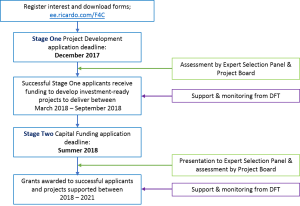

Key Features
The Department for Transport (DfT) are promoting the development of an advanced low carbon fuels industry within the UK through the new Future Fuels for Flight and Freight Competition (F4C). Through the F4C DfT aim to increase domestic production of advanced low carbon fuels capable of tackling emissions from the hard-to-decarbonise aviation and HGV sectors in pursuit of long-term UK decarbonisation targets. In addition, the F4C is designed to stimulate investment and create jobs through the development of a prosperous domestic industry.
The F4C will provide up to £22 million in capital grant funding until 2021. The Competition will be run in two stages with Stage One (Project Development) now open for applications until December 2017 (please note, the exact application deadline date will be announced on the 21st September).
Programme: F4C
Award: A share of £22m
Opens: 29th Aug 2017
Closes: 8th Dec 2017
The key objectives of the competition are:
The DfT’s objectives for projects within the competition are:
Competition stages

During Stage One, the F4C will provide up to £2 million of Project Development Funding until September 2018 to support the development of proposals for Stage Two.
Only organisations that have successfully completed Stage One will be able to apply for Stage Two funding.
Stage Two of the F4C will provide up to £20 million in capital grant funding over three years (summer 2018 to March 2021) for major demonstration projects providing transformative and innovative solutions. The F4C will support the development of new technologies, testing of novel feedstocks and the construction of new facilities for the commercial production of low carbon fuels.
Eligibility Criteria
In order to be eligible to apply to Stage One of the F4C, a project must comply with the following minimum requirements:
Technology scope
Feedstocks and sustainability
Project details
All applicants to Stage One should note that Stage Two has an additional set of eligibility criteria that must be met by the time of the Stage Two application.
For more information, click here to read the guidance notes.